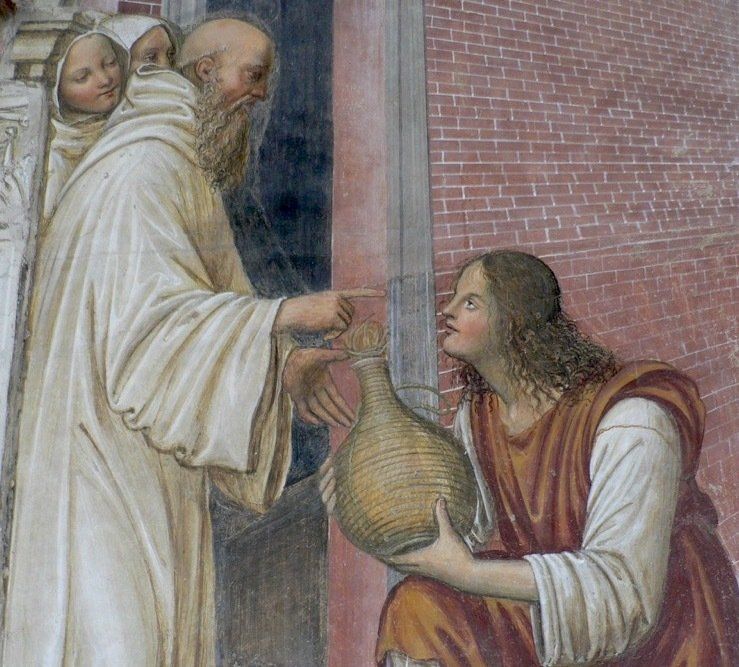St Benedict in a Time of Crisis
We don’t think of St Benedict living at a time of crisis. The orderly way of life that Benedict presents in his Rule speaks of calm, order and peace. Anyone making their way up to the great monastery of Monte Cassino where Benedict died will find PAX, ‘peace’, in large letters above its door. Peace is a delicate thing, and peace is only to be found in a crown of thorns, found amongst the struggles. Peace is found in a world that is broken and afraid, in a world that is often dark and troubled.
We don’t think of St Benedict living at a time of crisis, but he did. The first half of Benedict’s life was a time of relative prosperity, peace and good government, but all that came to a sudden end, and the last 15 years of his life were a time of war, destruction and hardship, with shortages of food and basic goods.
There were two natural disasters that afflicted Benedict in his time. The first was a climate crisis, an extraordinary change of weather patterns. In 536 the sun disappeared for nearly a year behind a veil of dust, shining feebly with a strange blue light, not global warming but global cooling. There were volcanic eruptions, floods and earthquakes, crop failures and famine. Today we mark the death of St Benedict around 547, but he lived through a pandemic in his final years. The plague of Justinian from 541-42 is estimated to have killed 30 to 50 million people. (World Economic Forum estimate).
St Benedict lived at a time of crisis, but his Rule helps us find a way through when an invisible enemy lies at its door. As Abbot, he strove to cure unhealthy ways (RB 2), apply the ointment of encouragement and the medicine of Divine Scripture (RB28).
From the Rule his monastery seems clean and orderly. The brothers wash, the towels are washed, the utensils are washed and returned in good condition. Of the tools of the monastery he says that everything should be cared for: “Whoever fails to keep the things belonging to the monastery clean or treats them carelessly should be reproved.” What do those strong words mean for us, when we have each other’s health at stake at this time of crisis?
Benedict talks about the proper amount of food and drink, and is concerned about any excess. As the temptation is to ‘panic buy’ we try to remember that resources are to be shared. He talks about times of shortage – he experienced it. When something is not available, he asks us not to grumble (RB40) Rather he asks his brethren to pull together when times are tough for they would all have to do a bit more to bring in the crops, and put food on the table (RB48).
In contrast to some other rules of the time he shows genuine sympathy for the sick. He provides for a separate room for their care and as he recognizes in another context, isolation can be of benefit “lest one diseased sheep infect the whole flock” RB28. Benedict shows particular concern for the elderly, and gives them special consideration as we are asked to do.
Concern for the order and cleanliness of the monastery, is but a reflection of his concern for the spiritual order of our lives, and the cleanliness of our souls. Each day we are reminded more forcefully of Benedict’s injunction to “keep death daily before our eyes” so that we are all a bit more attentive to what we do (RB4). In his Prologue he reminds us to live each day as best as we can, because this life does not go on forever.
Our celebration on 21st March of the feast of St Benedict this year is a sad occasion. This is perhaps the first Mass since the monastery was founded where we have had to keep the doors locked. It is sad to begin a period of isolation on the feast of St Benedict, when joy is tinged with sadness that our parishioners and oblates, neighbours and friends and retreatants cannot join us around this altar. For St Benedict, as well as a place where we as brothers become a community, the altar is the place where the monastery meets the world where guests, pilgrims and the poor are gathered, and we become one in Christ.
But the love of Christ, which St Benedict always put first, goes beyond human restrictions, and we remain united in Christ with those outside, the fearful and suffering and all those who are on the front-line of this crisis and who are love-in-action in our communities. May that love of Christ that casts out the fear be in the hearts of all at this time.
Benedict was a saint whose wisdom guided the world through the dark ages and continues to offer us a ray of light with a teaching that points to Christ. The care, the love, the compassion he shows can guide us still as we learn to use these days of isolation well, bearing one another’s burdens of body or character with the greatest patience.
St Gregory the Great tells us that his response to a pandemic was practical: Benedict issued food and olive oil to local people to make sure they were kept well. As we hear from St Paul in a reading for the feast of St Benedict: “Do not give up if trials come; and keep on praying. If any of the saints are in need you must share with them.” Romans 12:12-13
Crisis, or no crisis, we all remain one in the Body of Christ. We will carry on doing what we have been called to do: praying for Church and the world, not neglecting its needs but trying to put that love into practice. What St Benedict calls: putting nothing ever before the love of Christ.










